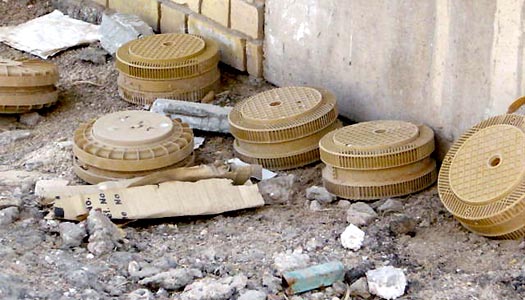Untitled Document

BAGHDAD, 6 Jun 2005 (IRIN) - Ongoing insecurity in Iraq is hampering the clearance
of landmines and unexploded ordnance (UXO), forcing international organisations
to leave the country or halt operations, experts told IRIN.
"The work in Iraq has become restricted for UN staff due to insecurity,
which has increased every day in the country. We have been depending on private
companies to support us, which have been doing great and efficient work in the
south of Iraq," Salomon Schreuder, cluster manager of mine clearance for
the United Nations Assistance Mission to Iraq (UNAMI) told IRIN from the Jordanian
capital, Amman.
Some of the NGOs that have stopped clearing mines are Danish Church Aid (DCA),
Norwegian Peoples Aid (NPA), Handicap International (HI) from France and InterSOS
from Italy.
Decades of war and internal conflicts have left Iraq with large quantities
of UXO and mines, and in some parts of the country, depleted uranium (DU) contamination.
These pose a serious threat to the safety of the population, internally displaced
persons (IDPs) and refugees, while preventing access to important resources,
such as agricultural and grazing land, roads, water sources and residential
areas.
Based on the last mine clearance survey by UNAMI in January 2005, an estimated
727 sq km were affected by mines, 6,370 sq km by border minefields, and 851
sq km were UXO/battle affected.
The Mines Advisory Group (MAG), a British NGO operating in the area for more
than a decade, has removed more than 1,350,000 mines and UXOs from the northern
governorates of Iraq since July 2003, but security concerns have delayed its
work since the beginning of 2005.
According to local mine clearance officials, northern Iraq is said to be worse
affected than the centre and south of the country. It is estimated that more
than 12 million mines and UXO units are still present, and Sulaimaniyah in the
northeast - representing nearly 200 sq km of the country's contaminated areas
- still has almost 80 percent of its area under alert conditions.
Aid workers say more progress needs to be made on clearing land to ensure safety.
"Despite the brave work from all agencies to clean up the mines in Iraq,
many areas are still heavily mined and difficult to access. The Iran-Iraq border
is the most heavily mined area and requires intensive work. We are doing the
best ... [we can] and hope that in the coming years Iraqis will walk in the
land safely," Tom Molican, a local senior official of the Danish Demining
Group (DDG) told IRIN.
To help speed up the process, the DDG, supported by UNAMI, has begun a US $4
million initiative to set up a local NGO by December to work on demining.
"It will establish a national NGO capable of dealing with a broad cross-section
of explosive ordnance, as well as training and management of staff," Schreuder
explained.
The figures for deaths or injuries caused by mine/UXO explosions in the country
are unknown, but studies are being conducted to determine the number.
In the south of Iraq all the areas cleared since May 2003 have been used for
agricultural proposes and providing safe access for local communities, bringing
development and an income to hundreds of families.
"My land was mined by UXOs, but thanks to the UNAMI and DDG, today I can
walk in it without being afraid of being a victim of decades of war in Iraq,"
Abu Hussam, 62, told IRIN in Basra. "I lost my son to one of the mines
... today I have planted rice in my land again, after more than 20 years."

